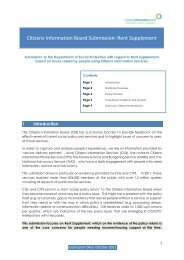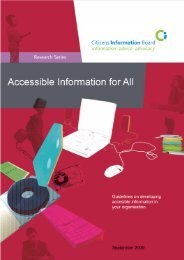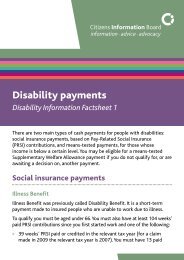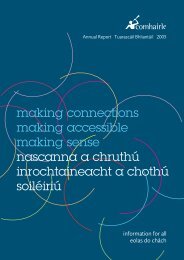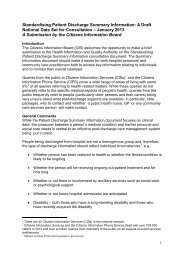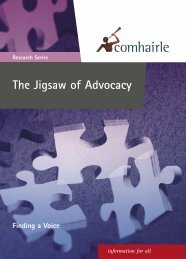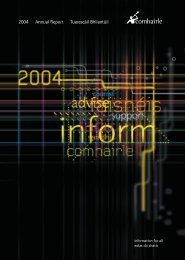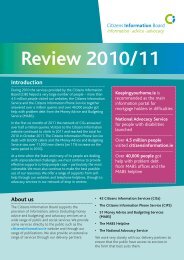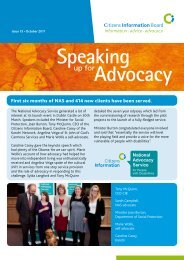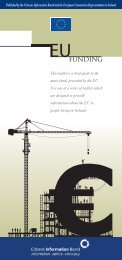Review of Sign Language Interpretation Services and Service ...
Review of Sign Language Interpretation Services and Service ...
Review of Sign Language Interpretation Services and Service ...
- No tags were found...
Create successful ePaper yourself
Turn your PDF publications into a flip-book with our unique Google optimized e-Paper software.
4.8.1 The impact <strong>of</strong> the absence <strong>of</strong> accreditationIn the absence <strong>of</strong> accreditation, <strong>and</strong> given the difficult supply situation particularlyoutside Dublin, registered trainees (those who have completed the Trinity coursebut who have not been through an accreditation process) are under pressure towork in situations where their skills are not appropriate; this is seen as both a health<strong>and</strong> safety issue <strong>and</strong> an ethical issue. For Deaf people, it means that they are lesscertain that their needs will be met in any given interpreting situation. At anotherlevel, the absence <strong>of</strong> accreditation has meant that skilled <strong>and</strong> experienced registeredtrainee interpreters cannot move on to the fee rates that apply to registered qualifiedinterpreters, thus creating financial disincentives to stay in this field.4.8.2 What is neededThere is strong consensus that an accreditation process, linked to registration <strong>and</strong>regulation, is urgent, <strong>and</strong> that the process must keep up with the output from theCentre for Deaf Studies training programme.There is an equally strong consensus that accreditation for individual interpretersshould not be a 'once in a lifetime' event. Interpreters need to be re-accreditedfrom time to time, particularly if they have left the field for periods <strong>of</strong> time, assome do; a system <strong>of</strong> regular monitoring <strong>and</strong> supervision is also an essential part<strong>of</strong> a regulatory process.There was also a view that Irish <strong>Sign</strong> <strong>Language</strong> teachers should be accredited aswell as interpreters.The accreditation for specialist skills such as legal interpreting has not begun to bediscussed, in the absence <strong>of</strong> the base level <strong>of</strong> accreditation.4.8.3 How should the accreditation system be developed <strong>and</strong> managedThe actual process <strong>of</strong> accreditation must be credible, objective, transparent <strong>and</strong>confidential. The process may not be a 'one event' process; those applying foraccreditation should have clear advance information about the process that will beused, the st<strong>and</strong>ards that will be applied, <strong>and</strong> the expectations/views <strong>of</strong> theassessors about appropriate forms <strong>of</strong> interpreting. Practical competency testing <strong>of</strong>interpreters was seen as essential; accreditation <strong>of</strong> a training programme is notsufficient. However, the level <strong>of</strong> achievement in the final examination could beassigned a specific value, as one part <strong>of</strong> the accreditation process.Concerns were raised about the appropriateness <strong>of</strong> having interpreters assessedby colleagues in the field, <strong>and</strong> the difficulty <strong>of</strong> securing independence <strong>and</strong>objectivity in a situation where there is such a small pool <strong>of</strong> interpreters whowould all be known to each other.There was a diverse range <strong>of</strong> views as to the form that the accreditation processshould take, <strong>and</strong> how it should be operated <strong>and</strong> managed. Some contributors sawmerit in adopting the UK accreditation system, while others felt quite strongly thatan Irish system is needed, with Irish st<strong>and</strong>ards. A third view was that a partnershipbetween the UK accreditation process <strong>and</strong> the appropriate Irish authority in thismatter would be effective, allowing Irel<strong>and</strong> to take advantage <strong>of</strong> systems <strong>and</strong>processes that have been developed in the UK, but also applying these in the Irishpage 74 • <strong>Review</strong> <strong>of</strong> <strong>Sign</strong> <strong>Language</strong> <strong>Interpretation</strong> <strong><strong>Service</strong>s</strong> <strong>and</strong> <strong>Service</strong> Requirements in Irel<strong>and</strong>



